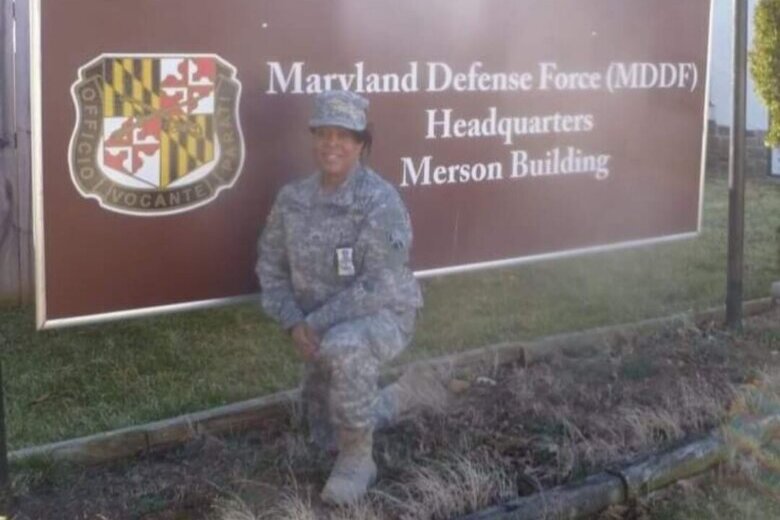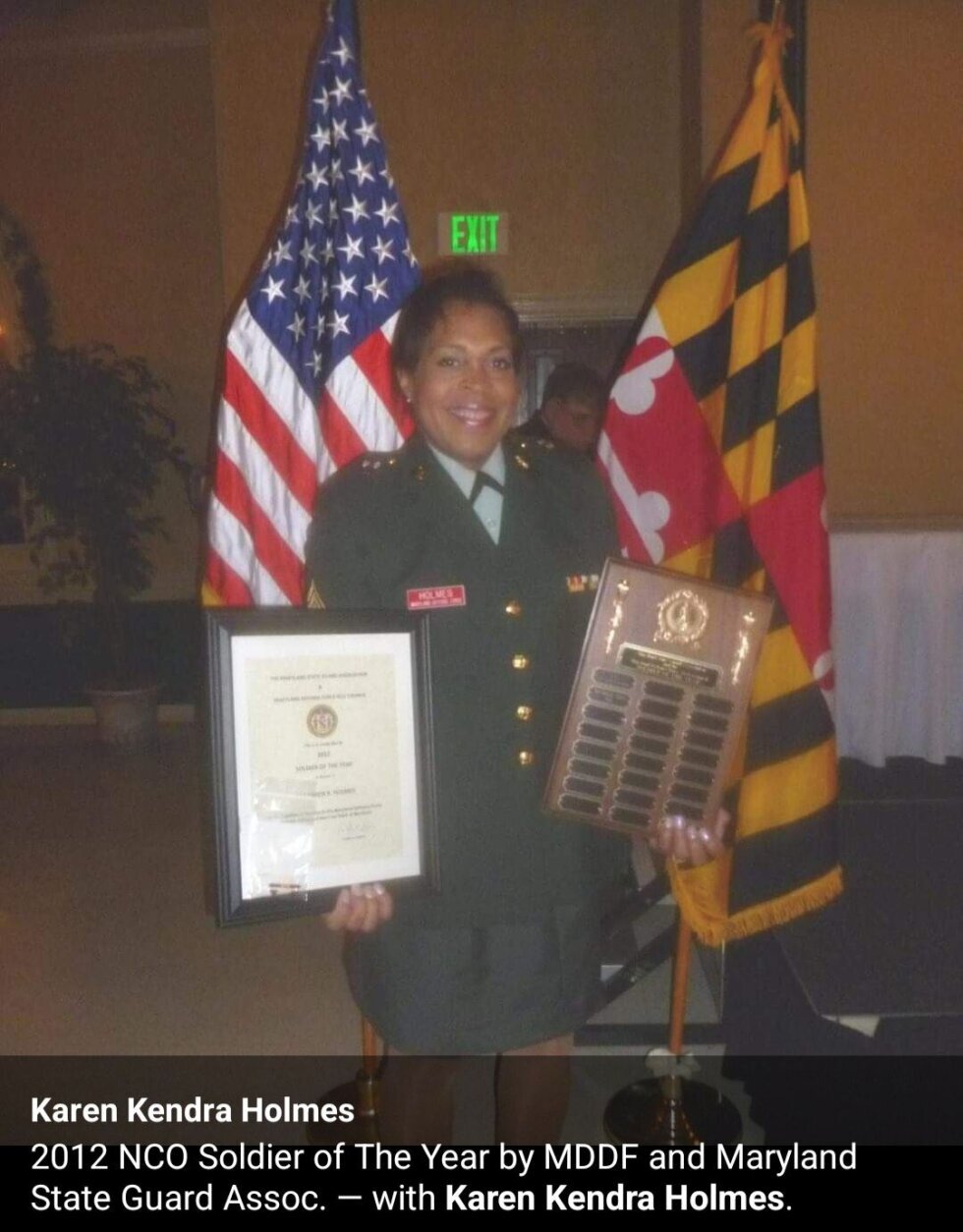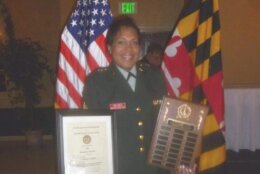





Every week, WTOP is celebrating a Pride Hero who has made a difference in the LGBTQ+ community in the D.C. area. It’s part of our Pride Month coverage. Check back all throughout June as we share these stories on air and online.
Hearing the words ‘covert operation’ may make you think of the military. In Karen Holmes’ case, it was her experience transitioning and hiding the fact that she was transgender after she joined the Maryland Defense Force in 2011.
Holmes, who grew up in Silver Spring, Maryland, started serving her state 13 years ago, in the immediate aftermath of the repeal of the “Don’t Ask, Don’t Tell” military policy that discriminated against LGBTQ+ service members. While the Maryland Defense Force never fell under the policy, Holmes was still concerned.
On Wednesday, President Joe Biden potentially pardoned thousands of veterans who were convicted of violating a former military code banning consensual gay sex.
‘Don’t Ask, Don’t Tell’
“Don’t Ask, Don’t Tell,” a term coined by former President Bill Clinton, was adopted by the military in 1994 and prohibited LGBTQ+ service members from expressing their identities without being potentially discharged.
Over 30,000 people were discharged under the “Homosexual Conduct” policy, according to the Department of Defense. Over 19,000 of those service members were discharged before “Don’t Ask, Don’t Tell” was enacted, and over 13,000 others were discharged while the policy was enforced.
- How victims of LGBTQ hate crimes can get help in DC
- Dating without romance? How aromantic individuals describe their lives
- At his first Pride parade, he hid behind a tree so nobody would see him. Here’s how he became an LGBTQ ‘hero’
- Mental health expert highlights hurdles facing LGBTQ+ youth this Pride Month
Holmes joined the Maryland Defense Force just two months after the “Don’t Ask, Don’t Tell” policy was repealed. She said the transitional period in the years that followed while serving her state were challenging.
A transformative journey
Holmes started wearing women’s clothing when she was 13 years old and went through phases of throwing those clothes away, thinking she could move past what she felt. But in 2010, her friend invited her to a trans health conference in Philadelphia.
“As soon as I walked in, I’m seeing 5, 6, 7-year-old kids having a really good time and their parents were supporting them and it was just awesome,” Holmes said.
She attended some of the workshops at the Philadelphia Trans Health Conference where she was able to hear experiences from other transgender people. Their stories made her realize how similar hers were, as well as the importance of sharing life experiences to help other people who were going through the same thing. Holmes said that’s when she understood who she really was.
“My story may trigger something in that person, or somebody else’s story may trigger mine. That’s what happened back in 2010,” Holmes said.
After leaving the conference, she returned to work at AmeriCorps, a government agency that provides volunteer service in challenging situations across the country, where she had been working since 2001. She came out to her supervisors as transgender and went through an extensive, but supportive, process to begin her transition in and out of the workplace.
While keeping her position at AmeriCorps, she joined the Maryland Defense Force in 2011 after being recruited for her work at a Community Emergency Response Team (CERT) rodeo.
During her onboarding process, she was worried that officials with the Maryland Defense Force would find out she was transgender, but she was able to get a physical from her personal primary care provider and submit her passport, which she had changed from her birth name.
“After I transitioned, to have to hide who you are, I was afraid if somebody spotted me. What if somebody knew that I was transgender?” Holmes said.
A successful military career
She was brought in as a corporal and worked as a Chaplain’s assistant doing Force protection, and joined the Color Guard team. During her time in the Force, she led multiple teams and credited them for being very responsive to her direction and doing great work.
In 2012, Holmes won NCO Soldier of the Year by the Maryland Defense Force and the Maryland State Guard Association, and in 2013, by the State Guard Association of the United States, she won Soldier of the Year for her leadership and achievements at her post.
“The response I heard at both awards were the female soldiers coming up to me and going, ‘great job, you’re doing it for us,’ and I’m like saying to myself, ‘yeah, because that’s in my mind, heart and spirit, but I’m also doing it for the transgender community which I can’t talk about because they didn’t want us in there,’” Holmes said.
The “Don’t Ask, Don’t Tell” policy was repealed, but Holmes was still worried about potentially being outed.
“I just didn’t know how the response was going to be. I kept it very secret,” Holmes said.
In 2018, the Department of Defense submitted a report to former President Donald Trump saying that allowing transgender people to serve in the military could “undermine readiness” and “impose an unreasonable burden on the military that is not conducive to military effectiveness and lethality.” From there, he signed a memorandum that banned some trans people from serving.
“It bothers me whenever I hear, back in the day, when former President Trump was saying there would be no readiness in the military if a trans person was involved. I’m like, ‘Seriously? We are always backing up each other.’ That’s who you’d consider a battle buddy, you’ve got somebody there who’s going to watch your back,” Holmes said.
‘Open’ to the future
While she was secretive about her identity at her job, on her Facebook account, Holmes was very open. She often posted pictures in front of her mother’s fireplace where there was a family portrait, showing her pre-transition.
“One of my fellow soldiers on Facebook saw that and he said, ‘Is that you in the portrait?” And I didn’t want to lie to him, so I said, ‘Yeah, that’s me,’” Holmes said.
Following an interview with Baltimore’s ABC-TV affiliate about transgender people serving in the military, Holmes said everyone in her command staff found out she was transgender.
She said they contacted the National Guard, who is supported by the Maryland Defense Force, and responded with nothing but support.
Holmes retired as a Staff Sergeant from the Maryland Defense Force in 2017. She’s now with the United States Veterans Reserve Corps and serves as a Chief Warrant Officer 2.
Now, Holmes travels across the U.S. in an aim to bridge the gap between transgender people and law enforcement, demonstrating communication that creates a safe interaction between the two.
Get breaking news and daily headlines delivered to your email inbox by signing up here.
© 2024 WTOP. All Rights Reserved. This website is not intended for users located within the European Economic Area.








